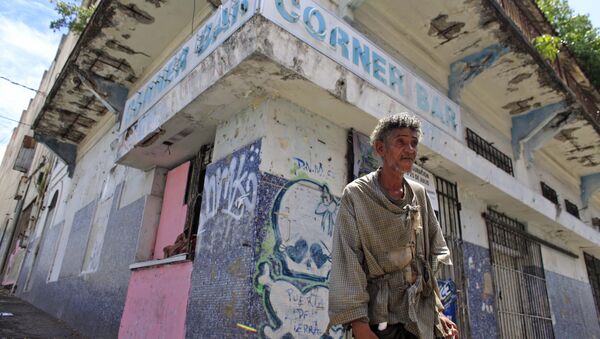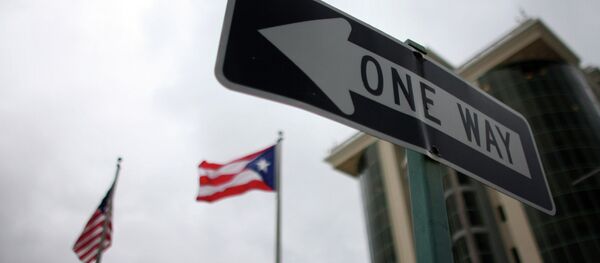Kristian Rouz — Puerto Rico's financial insolvency came to prominence in early August after the US island territory found itself mired in a partial default on its debt, stirring a debate regarding the local government's inability to properly collect taxes, exacerbated by opportunistic investors benefiting from the territory's rating downgrades. The issue of Puerto Rican debt is, however, a more longstanding one and stems from its multi-year fiscal inefficiency, economic depression, and reliance on fossil fuel imports amid a lack of business activity. Aside from all that, there is also the important issue of the island's ambiguous status within the US. As a territory within the Union, Puerto Rico has long been unable to collect corporate taxes from local branches of US enterprises as part of the so-called ‘triple tax exemption', thus stirring a debate revolving around possible Puerto Rican statehood or greater autonomy; each option offers the hope of potentially fixing the fiscal loopholes and bailing out the island's battered budget.
The US Department of Treasury has put forth an intermediary solution to the most acute aspects of the debt crisis. According to the Treasury's plan, the The US government should assist the island's government in the collation of taxes from local residents and businesses, thus improving Puerto Rico's fiscal performance. Indeed, the Department of the Treasury of Puerto Rico is notorious for being unable to collect some 44% of the island's Sales and Use Tax (roughly $900 mln annually). This, however, would be insufficient: the actual public debt of Puerto Rico stands at $165 bln, or 150% the island's GDP (according to some sources, the actual figure may be as high as $190 bln). Meanwhile, the outstanding debt accounts for $70 bln, or 68% of GDP.
Puerto Rico's main issue is the ‘triple tax exemption', which stems from the island's status as a US territory.
Interest paid to Puerto Rican bondholders is tax-exempt at the local, state and federal level, thus adding to the island's fiscal struggle. Also, Puerto Rico receives less money from the federal government as most residents of the island do not pay federal taxes, thus the island does not enjoy the subsidies and other financial benefits that states usually receive.
Puerto Rica's financial policy is limited and inefficient; there is no monetary policy on the island as it does not have its own central bank and is subject to the US Federal Reserve. Adding to the financial insolvency, Puerto Rico's local governments lack yet another form of leverage that usually allows governments to fix such situations: it does not control its own money supply and it uses the US dollar as a currency, meaning that in terms of monetary policy it acts as a US state, while not being one.
Now, the US Treasury's plan to supervise local tax collection is utterly insufficient to provide a lasting solution to the greater issue of the island's fiscal mismanagement. In a situation where people are reluctant to pay taxes and the federal government is naturally reluctant to subsidize the island, which, at the same time, has no legal right to collect corporate and interest income tax and is struggling to collect the rest, wishful thinking would hardly help.
"Right now, Puerto Ricans… would say, ‘Go to hell. I'm not paying the US government,' " a source at the IRS told the New York Times recently, providing a self-explanatory clue to what is happening with the island. Without any reliable source of financing, the Puerto Rican government has to increase external borrowing.
A bailout deal is unlikely for Puerto Rico at this point, as outlined in the US Treasury's proposal. Meanwhile, the island's creditors are not receiving any interest payments (except those which were high-yielding, at some 46%, and tax-exempt), but before the situation changes for the better, they will find themselves mired in endless lawsuits.
The Treasury-proposed tax-exchange scheme will provide, at best, some $900 mln in new annual revenue to the Puerto Rican government, which is much less than enough to address its $72 bln stalemate. The island will likely have to issue new bonds to ensure its ability to ensure the existing debt, however, the current situation will repeat without more decisive federal interference. That would entail administrative reform coupled with austerity measures: the island needs to become able to sustain itself.
Puerto Rico must pay $354 mln when it services its debt on 1 December, and the White House, like the Treasury, announced it would not bailout the island. Now, to prevent a full-blown Puerto Rican default, Washington has to consider tweaking its fiscal regulations in regard to Puerto Rico, as well as ending the administrative ambiguity regarding the island's status as a territory.
Among other things, Washington might want to consider tougher supervision over the Puerto Rican fiscal system and its performance, and loan guarantees in order to sedate the island's creditors. A Puerto Rican default would mean a suspension of select public services like healthcare and education due to a lack of financing, and disrupt fuel imports, meaning the islanders would have to pay for such services out of pocket. To avoid this, Puerto Rico might be declared bankrupt as a US state under US bankruptcy law, but the Republican majority in Congress would firmly oppose such an idea (they don't pay taxes, why should we bail them out?)
For now, Puerto Rica's financial situation is poised to deteriorate amidst the already rife economic depression. The easiest way for Washington to deal with the problem would be to allow the island to collect all taxes, including the corporate and bond interest income taxes, on its territory, while observing and helping in the efficiency of tax collection. Austerity measures would also be a step in the right direction in altering the situation from the current ‘not paying taxes, enjoying social benefits' and embracing a brutal, yet fiscally sound 'paying taxes, enjoying limited social benefits' approach.




